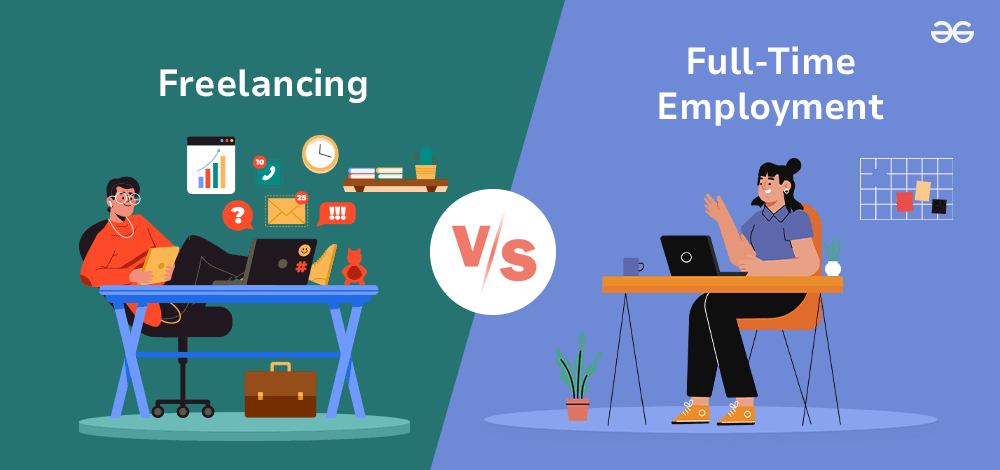Freelancing vs. Full-Time Jobs: Which One Is Right for You
Freelancing vs. Full-Time Jobs: Which One Is Right for You?
Introduction
In today’s fast-evolving job market, professionals often find themselves choosing between two primary career paths: freelancing and full-time employment. Some enjoy the flexibility and independence that freelancing offers, while others prioritize the stability, security, and benefits of a full-time job.
But which one is the right choice for you? Both have their pros and cons, and the best option depends on your personal preferences, career goals, and financial needs. Let’s explore freelancing and full-time jobs in detail to help you make an informed decision.
What is Freelancing?
Freelancing refers to working independently without being tied to a single employer. Freelancers provide services on a project-by-project basis and typically work with multiple clients at the same time. They can choose their own projects, set their own schedules, and negotiate payment terms directly with clients.
Types of Freelancing Jobs
Freelancers work in various fields, including:
- Writing
& Content Creation – Blogging, copywriting, SEO writing
- Graphic
Design & Multimedia – Logo design, video editing, illustration
- Web
Development & IT – App development, software engineering,
cybersecurity
- Digital
Marketing – Social media management, PPC advertising, email marketing
- Online Teaching & Consulting – Language tutoring, business coaching, academic consulting
Freelancers usually find work through online platforms like Upwork, Fiverr, Freelancer, and Toptal, or through personal networks.
Pros of Freelancing
✔ Flexibility & Independence – Work whenever and wherever you want.
✔ Unlimited Earning Potential – Income depends on your skills and effort.
✔ Variety of Work – Work with different clients and gain diverse experience.
✔ No Office Politics – No boss or fixed workplace stress.
Cons of Freelancing
❌ Unstable Income – No guaranteed salary; income may fluctuate.
❌ No Employee Benefits – No health insurance, paid leave, or pension.
❌ Self-Discipline Required – You must manage your time and workload efficiently.
❌ Client Dependence – Finding reliable clients can be challenging.
What is a Full-Time Job?
A full-time job involves working for a single company under a fixed contract. Employees work for a set number of hours (usually 35-40 hours per week) and receive a monthly salary along with various benefits.
Types of Full-Time Jobs
- Corporate Jobs – Accounting, marketing, HR, IT management
- Government Jobs – Civil services, public administration, law enforcement
- Manufacturing & Engineering – Mechanical engineering, factory management
- Healthcare & Education – Doctors, nurses, teachers, professors
Pros of Full-Time Jobs
✔ Stable Income – Receive a consistent salary every month.
✔ Job Security – Employment is more stable compared to freelancing.
✔ Employee Benefits – Health insurance, paid leaves, retirement plans, etc.
✔ Career Growth & Promotions – Opportunities for promotions and raises.
Cons of Full-Time Jobs
❌ Fixed Schedule – You must work set hours, limiting flexibility.
❌ Limited Earnings – Salary is fixed, with little room for sudden financial growth.
❌ Workplace Politics – You may need to deal with office culture and hierarchy.
❌ Less Creative Freedom – Tasks are assigned, and there’s limited control over work.
Freelancing vs. Full-Time Jobs: A Side-by-Side Comparison
Which One Should You Choose?
Freelancing is best for you if:
✅ You prefer flexibility over job security.
✅ You have a strong skill set and can find clients independently.
✅ You are comfortable managing your own finances and taxes.
✅ You enjoy working on different projects and gaining diverse experience.
A full-time job is best for you if:
✅ You need a stable income and job security.
✅ You prefer a structured work environment with career growth opportunities.
✅ You want employer-provided benefits like health insurance and retirement plans.
✅ You are comfortable working under a company’s policies and guidelines.
Can You Do Both?
Yes! Many professionals combine freelancing and full-time jobs to enjoy the best of both worlds. This is called "side hustling," where you keep your full-time job for stability while freelancing for extra income and experience.
Final Thoughts
There is no one-size-fits-all answer to freelancing vs. full-time jobs. Your choice should be based on your career goals, financial needs, and work style.
✔ If you want freedom, flexibility, and unlimited earning potential, freelancing is a great choice.
✔ If you prefer stability, job security, and a structured career path, a full-time job is the better option.
Whichever path you choose, Euro Staffs is here to help!
🚀 Looking for freelancing gigs or full-time job opportunities?
👉 Visit Euro Staffs and start your journey today!

 French
French
 Arabic
Arabic
 English
English



